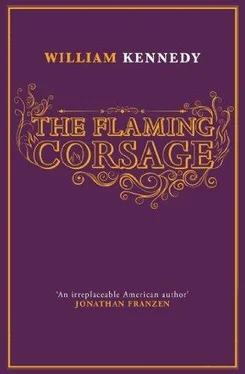“You’d do that?” Maginn asked Edward.
“What happened wasn’t your fault, was it?”
“You think it’ll work?”
“An alibi worked for those fellows who beat up the cops on the barge,” Edward said. “And what choice do you have?”
“I’d get into that bed if I were you,” Giles said. “We’ll figure out what to do about Cadden. I’ll get in touch with Sally. Here, have a drink.”
He poured a whiskey for Maginn, who swallowed it in a gulp.
Giles led the way to an empty bedroom and lighted a lamp. Maginn sat on a chair and took off his clothes.
“Underwear too,” Giles said. “If you’re naked it’s a better alibi. Am I right, Edward?”
“It’s logical.”
Giles handed the lamp to Edward, diminishing beside light, then pulled down the covers so Maginn could crawl beneath them.
Cadden walked into the room.
“Aren’t you in bed a little early, Maginn?” he asked.
Maginn by then had rolled fully under the covers and was lying in ten pounds of soggy gingersnaps that had been mixed with four quarts of warm chicken fat and spread between the sheets.
The puerile reduction of Maginn was a supreme success, but gave no satisfaction. It generated a predictable withdrawal in Maginn, but also in Edward, whose guilt was such that he stopped work on his new play, yet another confounding of intentions. Whatever seemed the right thing invariably proved otherwise. Could it be, Edward, that you were meant to be confounded unto the grave, that your destiny is linked to the everlastingly wrong choice? Was Katrina the wrong choice? Weren’t you ambivalent about your Stolen Cushion , about The Baron ? Hasn’t Maginn made you doubt even The Car Barns ? Is the play-in-progress a mistake? You’re a mindless achiever, moving toward you know not what. “Edward Daugherty, a formless lump of matter, was born into this world yesterday for no known reason.” Your sadness is a pose, Edward, your Weltschmerz sliced like liverwurst. You are different from everyone you know. You can’t afford to consider Maginn’s idea that all effort is a quest for the great cipher. You need a pair of spiritual spectacles to see things as they are. Understand this, Edward: you are still living your preamble.
Dinner at the Daughertys’, July 4, 1907
THE HEAT WORSENED. All screened windows of the parlors and dining room were open, all curtains and drapes tied back to the extreme; but the house was without a breeze. Dinner would be wretchedly uncomfortable and Edward was almost ready to take off his coat and tell Giles to do the same.
The women were another matter. Neither Felicity nor Katrina could easily shed a layer of clothing, nor were they likely to, whatever the degree; but then they were used to suffering for their plumage. Why do they do that to themselves? Edward decided he would wait for the missing guests before suggesting a dinner in shirtsleeves. Sweating through the city’s hot spell, instead of spending the holiday week in the Adirondacks, was his choice: a chance to meet socially with Melissa Spencer, the young actress Maginn was bringing to dinner.
With great verve in projecting the volatility of young love, with a face that demanded one’s attention, and a foxish smile that kept it, Melissa had taken Edward over when he saw her onstage; for she seemed the incarnation of the female lead of his new play. Suffer the heat for such gain.
And so he had begun this Independence Day holiday by taking Katrina to Washington Park for the morning band concert and reading of the Declaration of Independence, then lunch at Keeler’s and out to the Woodlawn Park track to see Giles’s trotter, My Own Love, foal of Gallant Warrior, the horse Edward had tried in vain to give to Katrina’s father. He had given it, instead, after neither Katrina nor her mother would accept it, to Giles, who had won frequently with it for years, then put it to stud, and now was reaping second-generational benefits; today the foal won its heats and also tied a track record, 2:01 for the mile.
Edward poured sherry for the Fitzroys, a pony of very old port for Katrina, and a Scotch whisky and water for himself. They were all in the Daugherty drawing room, sitting near the windows to harvest the breeze, should it arrive, rubber plants and ferns in lush leaf among them. The room’s personality reflected Katrina’s devotion to the revered dead. Geraldine, Jacob, and Adelaide, in hanging portraits, and Katrina’s poet, Baudelaire, in a pen-sketched self-portrait, all stared down at the occupants of the room. On a table between French porcelain vases and jade dragons the marble bust of the naked Persephone (a Katrina look-alike Edward had given her for their first anniversary) now seemed apt, chiefly as an adornment for the tomb of the Katrina-that-was: full woman then, now suitable only for admiration. Jacob Taylor’s pendulum clock hung silently on the wall, permanently stopped at 8:53 to memorialize the approximate instant when the burning stick pierced Katrina’s breast. And atilt on its hook opposite the mantel, a large gilt-framed mirror ensured that with even a cursory glance, one could monitor one’s own or the collective image of this overheated quartet: all eyes, including her own, always on Katrina and her chamber of venerated memory, her sumptuous crypt of exhausted life.
“Maginn is late, as usual,” Edward said.
“When we’re gathered around his deathbed,” said Giles, “he’ll be someplace else.”
“Do you have him to dinner often?” Felicity asked Katrina.
“Now and then. Why do you ask?”
“I find him so coarse, rather low-class in his tastes. And he paws you if he finds the opportunity.”
“He’s tried to get next to Felicity for years,” Giles said, “hasn’t he, love?”
“He has. It’s quite obscene what he once said to me.”
“Whatever did he say?” Katrina asked.
“I wouldn’t repeat it.”
“Paraphrase it,” Edward said. “Give us a thrill.”
“It had to do with anatomy,” Felicity said. “Mine.”
“And a splendid anatomy it is,” said Giles.
“Maginn does like women,” Edward said. “He’s also tried his hand at Katrina.”
“Not at all,” Katrina said. “It’s all talk.”
“He went after you in our garden.”
“No, no, no. He was flirting.”
“What I saw was beyond flirting.”
“We are never sure of what we see.”
Edward let it go. She would forever deny the slightest dalliance. On Francis Phelan, she was vehement. Even Giles’s pitiful effort at a beach picnic (“May I touch your naked shoulder?”) she dismissed as an excess of friendship (“Just a lovable, silly man”). Like flies after sugar. The veneration of sugar.
“Maginn is afflicted, like a man with a stutter or a limp. He can’t help it,” Edward said.
“When God was handing out social graces,” Giles said, “Maginn was elsewhere, trying to seduce an angel.”
“Aren’t angels sexless?” Felicity asked.
“That would merely present Maginn with a challenge,” Edward said.
“But he’s just a reporter, such a common person,” Felicity said.
“I used to be a reporter,” Edward said. “Is that your view of my social position?”
“You’re very different.”
“You really mustn’t speak about people as ‘common,’ ” Giles said. “You shouldn’t type people that way.”
“Not even if it’s true?”
“It’s snobbish. Not everybody has the good fortune to be born into money and social status.”
“Are you quite sure that’s good fortune?” Katrina said.
“Who is this woman he’s bringing?” Felicity asked from her severe pout.
“Melissa Spencer, an actress,” said Katrina.
Читать дальше












